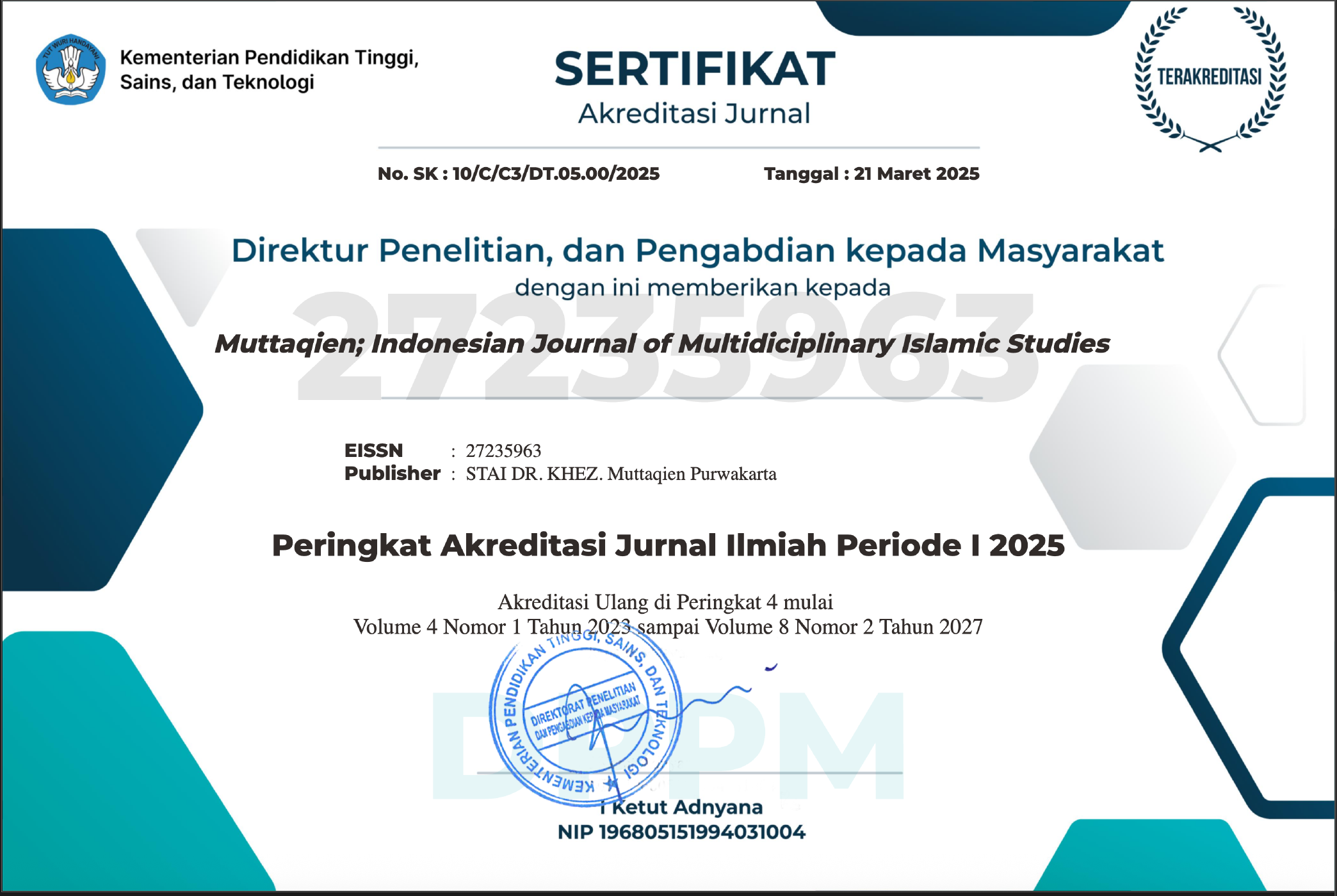Motif Larangan Penyembelihan Sapi oleh Sunan Kudus dan Relevansinya terhadap Penguatan Moderasi Beragama
Keywords:
Tolerant Da'wah, Local Wisdom, Sunan Kudus, Prohibition of Cow SlaughterAbstract
Islamization in Java during the 15th-16th centuries AD proceeded peacefully without warfare. Ja'far Shadiq, popularly known as Sunan Kudus, was a wali who contributed significantly to the spread of Islam in Java in the 16th century AD. Sunan Kudus issued a fatwa to the people of Kudus at that time, prohibiting the slaughter of cows. This fatwa seemed contrary to Islamic teachings, which permitted the slaughter of cows for consumption or religious sacrifice. Interestingly, this fatwa is still practiced by the people of Kudus today. Nowadays, some Muslims, especially textualists, question this prohibition because it is considered inconsistent with Islamic teachings. This article aims to reassess the true intention behind the fatwa so that all parties can address it wisely. This study uses qualitative methods by collecting field and written data from books and journals. This research concludes that the fatwa prohibiting the slaughter of cows by Sunan Kudus cannot be separated from the social, religious, and cultural context of its time. Second, it was part of a tolerant da'wah strategy he implemented to continue the process of Islamization. Third, the prohibition was a form of respect for the traditions and beliefs of other religions, not an absolute and permanent legal ban, thus allowing for the slaughter of cows at the right time and place. The results of this study can contribute to efforts to reaffirm that respecting local traditions is a critical point to strengthen the paradigm of religious moderation.
References
Abdullah, Irwan, dkk. Ed. (2008). Agama dan Kearifan Lokal dalam Tantangan Global. Yogyakarta: Pustaka Pelajar.
Atulwafiyah, Ati. Dkk. (2023). Eksistensi Makna Larangan Penyembelihan Sapi di Kota Kudus. Jurnal UInSCof: The Ushuluddin International Student Conference Vol.1, No. 2. 1096-1107. https://proceedings.radenfatah.ac.id/index.php/UInScof2022/article/view/1111/867
Daniah. (2016). “Kearifan Lokal (Local Wisdom) Sebagai Basis Pendidikan Karakterâ€. Jurnal Pendidikan. 1-14. https://e-jurnal.staimuttaqien.ac.id/index.php/mtq/article/view/1060/244
Farobi, Z. (2018). Sejarah Wali Songo, Perjalanan Penyebaran Islam di Nusantara. Yogyakarta: Muezaa
Mujib, A. (2021). “Sejarah Masuknya Islam dan keragaman Kebudayaan Islam di Indonesiaâ€. Jurnal Ilmiah Kajian Pendidikan. 117-124. https://www.ejournal.iqrometro.co.id/index.php/pendidikan/article/view/164
Qasim, Muhammad. (2021). Fathul Qorib. Jakarta: Maktabah at Turmusi Titturasi
Rachmawati, Yuliana Nurhayu. (2018). Skripsi: “Sunan Kudus: Dinamika Ajaran, Tradisi dan Budaya di Kudus Jawa Tengah Tahun 1990-2015â€. Jakarta.
Shofa, Rizka Maula. (2020). Respon Masyarakat Terhadap Sejarah Syekh Ja’far Shoddiq tentang Larangan Menyembelih Hewan Sapi di Kudus. Thesis: Universitas Islam Sultan Agung Semarang. https://repository.unissula.ac.id/18971/.
Sibarani, Robert. (2023). Hakekat, Peran, dan Metode Tradisi Lisan. Yogyakarta: Penerbit Lontar.
Sumintarsih, dkk. (2016). Gusjinjang: Etos Kerja dan Perilaku Ekonomi Pedagang Kudus. D.I. Yokyakarta; Balai Pelestarian Nilai Budaya.
Sunyoto, A. (2017). Atlas Wali Songo: Buku Pertama yang Mengungkapkan Wali Songo sebagai Fakta Sejarah. Tangerang Selatan: Pustaka IIMan dan LESBUMI PBNU.
Suyono, Agus. (2011). Wali Songo Rekonstruksi sejarah yang disingkirkan, Jakarta: Tras Pustaka.
Syakur. (2021). Pendidikan Karakter dalam Larangan Menyembelih Sapi (Menelisik Filosofi Ajaran Sunan Kudus). Jurnal Pendidikan Agama Islam Universitas Wahid Hasyim Semarang. 18-38. https://publikasiilmiah.unwahas.ac.id/PROGRESS/article/view/2335/pdf
Tim Penyusunan Kementerian Agama RI. (2019). Moderasi Beragama, Cet 1. Jakarta: Badan Litbang dan Diklat Kementerian Agama RI.
Zakiya, Drajat. (2015). “Warisan Islam Nusantaraâ€. Jakarta: Jurnal al Turats. Vol. XXI No.1. 77-91. https://journal.uinjkt.ac.id/index.php/al-turats/article/viewFile/3827/2804
Zuhairi, Misrawi. (2007). Al Qur’an Kitab Toleransi Inkusivisme, Pluralisme dan Multikulturalisme. Jakarta Selatan: Penerbit Fitrah.
Published
How to Cite
Issue
Section
Copyright (c) 2024 Winarto Winarto, Ahmad Shuhada, Adika Arifin Matlawi, Nazwa Aulia Fitriyana

This work is licensed under a Creative Commons Attribution-ShareAlike 4.0 International License.
Muttaqien; Indonesian Journal of Multidiciplinary Islamic Studies allow the author(s) to hold the copyright without restrictions and allow the author(s) to retain publishing rights without restrictions and authors who publish with this journal agree to the following terms:
In developing strategy and setting priorities, Muttaqien; Indonesian Journal of Multidiciplinary Islamic Studies recognize that free access is better than priced access, libre access is better than free access, and libre under CC-BY-SA or the equivalent is better than libre under more restrictive open licenses. We should achieve what we can when we can. We should not delay achieving free in order to achieve libre, and we should not stop with free when we can achieve libre.
Muttaqien; Indonesian Journal of Multidiciplinary Islamic Studies has a CC-BY SA license or its equivalent as the optimal license for publication, distribution, use and reuse of scientific work. This license is under a Creative Commons Attribution 4.0 International License.
You are free to:
- Share — copy and redistribute the material in any medium or format
- Adapt — remix, transform, and build upon the material for any purpose, even commercially.
- The licensor cannot revoke these freedoms as long as you follow the license terms.










